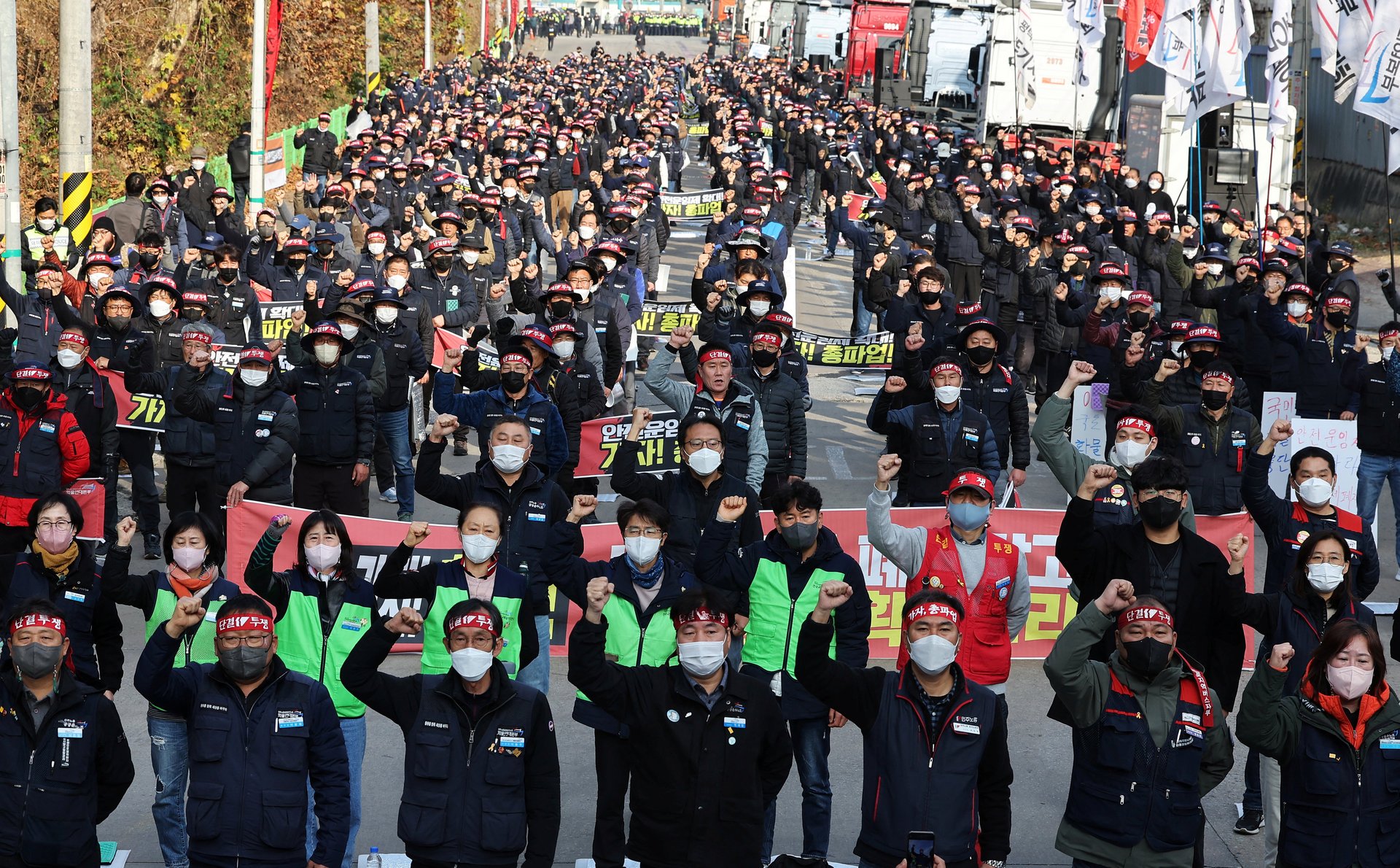🌏 Truckers take the wheel
Plus: Holiday travel is getting pricey.

Good morning, Quartz readers!
Here’s what you need to know
Truckers in South Korea went on strike. Major ports have been the target of nationwide demonstrations, the second in less than six months, in a move that could impact global supply chains.
Shanghai’s Disneyland is fully reopening. The theme park is back in business after a 25-day pause, despite record levels of covid cases and an increase in local restrictions.
Italy’s Atlantia is set for delisting. The Benetton family’s Schema Alfa and US fund Blackstone plan to complete a buyout of the infrastructure company in the coming weeks.
Turkey is ending its monetary easing cycle. The country’s central bank cut interest rates to 9% and announced that its fourth cut since August would be the last.
Jeffrey Epstein’s accusers sued Deutsche Bank and JPMorgan Chase. The two lawsuits claim the banks enabled the convicted sex offender‘s alleged sex-trafficking scheme.
Anwar Ibrahim was sworn in as Malaysia’s prime minister. After elections delivered an unprecedented hung parliament, the country’s king appointed the 75-year-old political veteran.
The UN called on Iran to end violence against protestors. Human rights chief Volker Türk said the situation is “a full-fledged human rights crisis” and called for an investigation.
What to watch for
India’s much-awaited Digital Personal Data Protection Bill 2022, introduced last week, is now open for public comment. The fourth and latest version of the controversial legislation should be more palatable than its predecessors to global technology companies, but internet freedom advocates argue that the country deserves better.
An earlier draft of the bill prescribed partial and total data localization obligations with respect to “sensitive personal data” and “critical personal data.” Companies such as Google, Twitter, and Amazon raised objections to these provisions. Now, the new draft eases the free movement of data to trusted geographies and also narrows down the law’s scope to only personal data protection, leaving out non-personal or anonymized data.
Some experts have criticized these changes, arguing that they have “watered down” the goals of a data privacy protection framework. Campaigners are now gearing up to convey those concerns during the consultation.
US holiday travel’s rising costs, by the digits
Thanksgiving travel rates are almost back to pre-pandemic levels, despite concerns of renewed chaos following a US summer season marked by delays and cancellations, misplaced baggage, and booked up accommodations.
Americans looking to go on holiday during the festive season are also facing the highest travel costs in five years, as these seven figures show.
31%: Americans who intend to travel between Thanksgiving and mid-January, down from 42% last year
12%: Increase in hotel room rates since 2019
46%: Jump in rental car rates since 2019
32%: Spike in inflation-adjusted airfare in 2022 compared to a year ago
16.9%: How much more Americans spent on domestic flights this year (through Oct. 17) compared to the same period in 2019
125%: How much more airlines spent on jet fuel in 2022 compared to 2021
777,000: Passenger and cargo airline employees working this holiday season, surpassing pre-pandemic employment
The future of effective altruism
The spectacular collapse of FTX hasn’t just threatened the crypto ecosystem, but has also delivered a credibility blow to the philosophy of effective altruism, a style of philanthropy espoused by the company’s billionaire founder Sam Bankman-Fried.
Effective altruism’s guiding principle is to maximize the good a human can do in the world, both now and in the future. To do this, one of its main proponents, William MacAskill, has encouraged people to make as much money as possible—for instance, by getting a job on Wall Street.
Bankman-Fried’s questionable and possibly fraudulent business practices don’t just tarnish the philosophy by association—they also invite the scrutiny of certain organizations, such as the Centre for Effective Altruism, that have sprung up in its support.
✦ On Saturday, the Weekend Brief will take a look at the philosophy of effective altruism, its founders, and their followers. To get our take, grab a Quartz membership today at 60% off.
Surprising discoveries
A long-lost Roman emperor may have been found. Gold coins previously deemed fake could prove Sponsian’s reign was real.
Doubloon-collecting is the shiniest trend on TikTok. Yes, people are tallying their booty with Excel spreadsheets, and no, it’s not a new crypto scheme.
Seal conservation is ready for its close-up. Facial recognition technology could be the key to protecting the marine mammal.
We finally know why lightning zigs and zags. It’s due to “singlet-delta metastable oxygen molecules,” but that doesn’t rule out Zeus being snubbed by a nymph, right?!
Dreaming of electric sheep is good for AI. Artificial neural networks may need down time to avoid episodes of amnesia.
Our best wishes for a productive day. Send any news, comments, electric dreams, and lost doubloons to [email protected]. Reader support makes Quartz available to all—become a member. Today’s Daily Brief was brought to you by Ananya Bhattacharya, Niharika Sharma, Cassie Werber, Sofia Lotto Persio, and Julia Malleck.